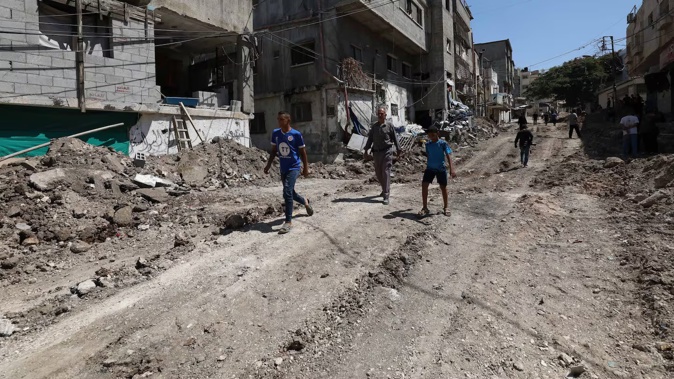
Foreign Minister Winston Peters is urging New Zealanders in Lebanon and Iran to “leave now while options remain available,” as tensions continue to rise in the Middle East, with threats of revenge after the killing of militant group Hamas’ leader.
Peters also said, on social media site X, the Government recommends New Zealanders in Israel “consider whether they need to remain in the country”.
Earlier today, the US told its citizens to leave Lebanon on “any available ticket,” amidst reports an Israeli strike has killed Hezbollah’s Fuad Shukr, deemed a “top military commander”.
The Israel Defence Forces confirmed IDF jets “eliminated” the man; the strike killed at least three people, and injured 74 more, according to the Health Ministry of Lebanon.
Fears are growing as Iran promises “severe” retaliation against Israel.
Iran blames Israel for the death of the leader of militant group Hamas - Ismail Haniyeh. The top political leader of Hamas was assassinated in Tehran - something Iran’s Revolutionary Guards deem a “terrorist operation”.
Militant group Hezbollah, based in Lebanon and backed by Iran, could play a prominent role in retaliation towards Israel - to which Israel could respond to.
A statement from Iran’s Revolutionary Guards threatened Israel was in for “a severe punishment at the appropriate time, place and manner,” following the death of Haniyeh.
SafeTravel last updated its advice for Israel and the Occupied Palestinian Territories on August 1, with a “do not travel” warning, “due to ongoing armed conflict, terrorism and the unpredictable security situation”.
“New Zealanders currently in Gaza are advised to shelter in a secure place and notify the Ministry of Foreign Affairs and Trade, as departure from Gaza is extremely difficult. The New Zealand Government has an extremely limited ability to provide assistance to New Zealand nationals in Gaza,” SafeTravel’s website said.
Kiwis are urged to avoid a number of places in Israel and across the West Bank, due to civil unrest and the risk of “rocket fire and military operations,” and an unstable security situation. Other places in Israel and the Occupied Palestinian Territories are under a level three of four risk, with Kiwis urged to avoid non-essential travel.
Lebanon is under a level four of four “do not travel” alert, last reviewed July 29, due to the risk of the security situation “deteriorating further”.
“As there is no New Zealand diplomatic presence in Lebanon, the ability of the New Zealand Government to provide assistance to New Zealand citizens is severely limited,” SafeTravel warns.
Iran is also under a level four of four alert due to its security situation.
“New Zealanders who are currently in Iran, including dual nationals, are strongly advised to consider leaving as soon as possible,” official travel advice reads.
Earlier today, the UK Government urged British nationals in Lebanon to flee the nation immediately, with concern the situation could “deteriorate rapidly”.
In a statement, British Foreign Secretary David Lammy said tensions are high: “While we are working round the clock to strengthen our consular presence in Lebanon, my message to British nationals there is clear - leave now.”
Lammy and Defence Secretary John Healey visited the Middle East, including Lebanon, earlier in the week to call for stability.
“As I told leaders in the Middle East this week, de-escalation must be the primary focus in the region, and we are urging all to dial down tensions. There must be an end to the fighting, an immediate ceasefire in Gaza, the release of all hostages, and a diplomatic path to peace and security,” Healey said.
American President Joe Biden was asked if there was a chance Iran would simmer down, as tensions grow - Sky News reports Biden replied with: “I hope so. I don’t know.”
The United States has backed Israel defending itself after Hezbollah attacks earlier in the week. The US has sent fighter jets to the Middle East to “defend” Israel, and deal with potential escalations - escalations Western governments suggest is becoming more likely, with updated travel advice getting stricter, and more urgent.
The United Nations agency for Palestinian refugees, UNRWA, said yesterday the situation in the West Bank is “worsening daily”.
“Israeli Security Forces’ operations continue causing destruction and threatening the lives of people in the area. This “silent war” has to end,” the agency added, stating camps were suffering water shortages, electricity outages, and malnutrition.
Recent Israel-based strikes have killed 15 Palestinians at a Gaza school, sheltering displaced people. The strikes came mere hours after the death of nine Hamas militants. Meanwhile, Hezbollah fired around 50 rockets towards northern Israel overnight.
UNRWA cites an assessment by the Global Education Cluster, from Unicef and Save the Children, as saying 85% of school buildings in the Gaza Strip have been directly hit or damaged.
The war in the Middle East has killed thousands of Palestinians, following the Hamas-backed attacks on October 7 which saw more than 1000 deaths, and hundreds of people taken hostage.
New Zealand’s Ministry for Foreign Affairs and Trade has been contacted for comment on the rising tensions and the latest travel advice.
Azaria Howell is a Wellington-based multimedia reporter with an eye across the region. She joined NZME in 2022 and has a keen interest in city council decisions, public service agency reform and transport.
Take your Radio, Podcasts and Music with you









